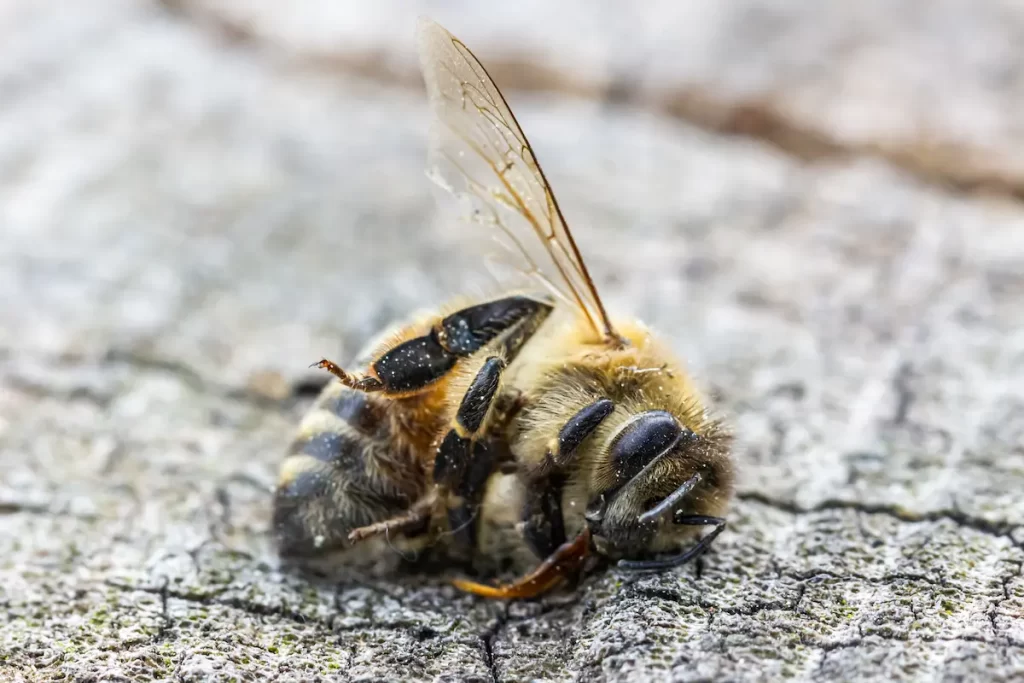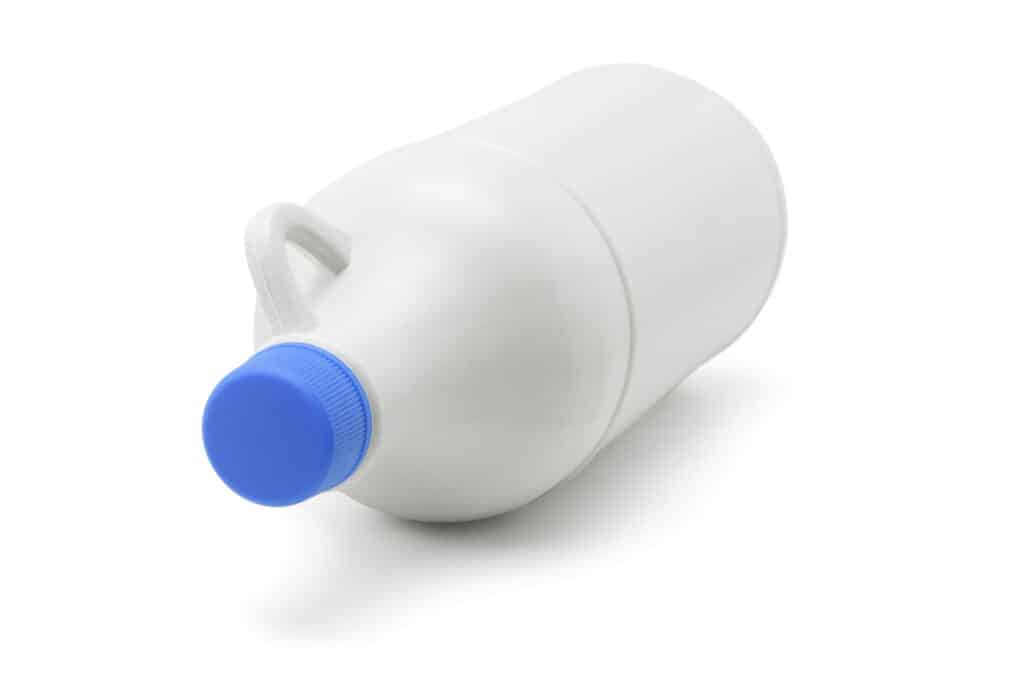The relationship between bleach and bees. Did you know that bleach is classified as a pesticide, albeit not an insecticide?
This means that bleach won’t kill bees unless they are completely submerged in it.
Nonetheless, since bees can drown in any liquid and considering the potential risks posed by both bleach and bees, it is not advisable to attempt to use bleach as a pest control method.
There are better alternatives. There are several DIY mixtures to help rid your home of bees, as well as traditional insecticides.
Bees are amazing creatures that play a crucial role in our planet’s ecosystem.
They are iconic and beautiful, but it can be difficult to appreciate their importance when your home is infested with them.
If necessary, some may wonder if using bleach is an effective solution to eliminate these stinging insects. Can we introduce bleach and bees hoping for a solution?
It’s a common misconception that bleach can effectively remove bees from homes.
Despite its potent pesticide properties, bleach is not an effective solution to eliminate pests.
To properly deal with bees in your home, it’s essential to know the do’s and don’ts. Let’s discuss them further.

Related Reading: Can Bleach Kill Bushes?
Table of Contents
Consider Whether You Need to Remove the Bees
I hope I don’t offend you, but have you considered whether removing bees is necessary?
While bees may be regarded as pests when they are near your home, they play a crucial role in the ecosystem of our planet and their populations are decreasing.
Some species, like honey bees and bumblebees, tend to be less hostile.
If you come across a large, buzzing nest that is not likely to be disturbed by your daily routine, it may be best to leave it alone.
Typically, nests will be abandoned by winter, usually in just a few months’ time.
If you can wait it out, it would be beneficial for the environment to refrain from disturbing them and allowing them to carry out their natural processes.
However, if necessary, some recommendations may be helpful.
Do Not Introduce Bleach and Bees: Use Only Appropriate Insecticides
As previously mentioned, bleach is not a practical solution for getting rid of bees. It’s as useful as water in this regard.
However, there are some inexpensive alternatives that you can find in your kitchen.
- Vinegar and water solutions in a spray bottle.
- Soft drinks are used as bait in traps.
- Mothballs are used as a repellent.
- Cinnamon is also used as a repellent.
- Commercial insecticides.
Naturally, if the problem becomes too big to handle by yourself, make sure to call in a professional.
Dress for the Occasion
It is common knowledge that bees are notorious for their stinging ability.
However, some individuals may attempt to manage a bee infestation without appropriate protective gear.
Although beekeepers are often seen wearing specialized suits, if one does not have access to such equipment, the best alternative is to wear loose, thick clothing. The looser the fit, the better the protection.
Please remember to protect your eyes with appropriate eyewear to stop bees from flying into your eyes.
I removed a wasp nest with some heading directly toward my eyes. My protective glasses helped immensely.
It is important to note that if your clothing is tight against your skin, a bee’s stinger may easily pierce through and reach your skin.
However, if you wear loose-fitting clothing, the stinger is more likely to get caught in the folds of the fabric instead of penetrating your skin.
Many individuals fail to acknowledge that bees are strictly active during the daytime, just like humans.
As a result, if a nest needs to be dealt with, the ideal time to do so is at night when the bees are probably asleep.
To summarize, it’s best to wear loose-fitting clothing, approach the hive at night, and apply insecticide to the entrance.
Observe the hive at dawn or dusk the following day for any activity, and repeat the process if necessary.
However, it’s important to also mention what not to do when dealing with a hive.
Never Plug the Entrance to the Hive
Blocking the entrance may seem like a piece of common knowledge to prevent access, but it’s not always the best solution.
This is particularly true when dealing with honeybees that are trapped in or out.
Reasons you shouldn’t block up a hive:
- It may aggravate the bees outside the hive.
- There’s a good chance they’ll find another way out.
- Honeybees store enough honey to last them months – they’ll be alive in there months after you block the entrance.
- If you manage to kill most of them and there is still honey, then that’s prime real estate for mold and other fungi.
- If you kill most of the colony and there is still wax, it may damage the fixtures the nest is attached to when it melts.
It’s worth noting that if you accidentally block the entrance to a wasp nest instead of a bee nest, the wasps can chew through materials like paper or wood to escape, even the walls of their own nest. It’s a pretty scary thought.

Do Not Spray the Hive or Swarm With Water or Ineffective Chemicals
Spraying a hive, or even worse, a swarm with anything other than insecticides you know for certain will work is a terrible idea.
Doing this will rile them up and you’re very likely to get stung multiple times in the process.
One concern is that using chemical insecticides to kill bugs may pose a risk to non-target animals like birds and pets, which could accidentally ingest them.
Do Not Try to Remove the Hive Yourself
It’s important to note that removing bees and beehives can be hazardous, even for experienced beekeepers and exterminators with proper gear.
It can pose a significant risk to anyone without the necessary expertise, including individuals who lack protective clothing.
If you are dealing with a large nest of bees, it is best to seek professional advice and services.
The aforementioned tips are more suitable for small-scale infestations and mild concerns regarding bees.
It’s not worth enduring a million bee stings just to prove your pride in removing them yourself. Others may question why you didn’t just call a pest exterminator instead.
Related Reading: Will Pressure Washing with Bleach Kill Grass?
Conclusion
As we learned, bleach and bees are not the best mix for removal.
There are several natural DIY mixes that can serve as insecticides. If they prove to be ineffective, traditional chemicals may be the most suitable option.
It’s important to thoroughly contemplate whether removing the bees is absolutely essential.
It’s important to keep in mind that bees are incredibly valuable, and it’s crucial to take all necessary precautions to prevent harming them.
If you determine that removal is required, please ensure to wear proper protective gear such as loose-fitting clothing, eye protection, a hat, and a mask.
Keep in mind that bees tend to be less active during nighttime, making it an ideal time for removal work.
If you find the bee removal process to be a daunting task or if there is a large number of bees, it is advisable to seek the assistance of a professional.
Safety first…Always!
Enjoy living the outdoor life!!!
